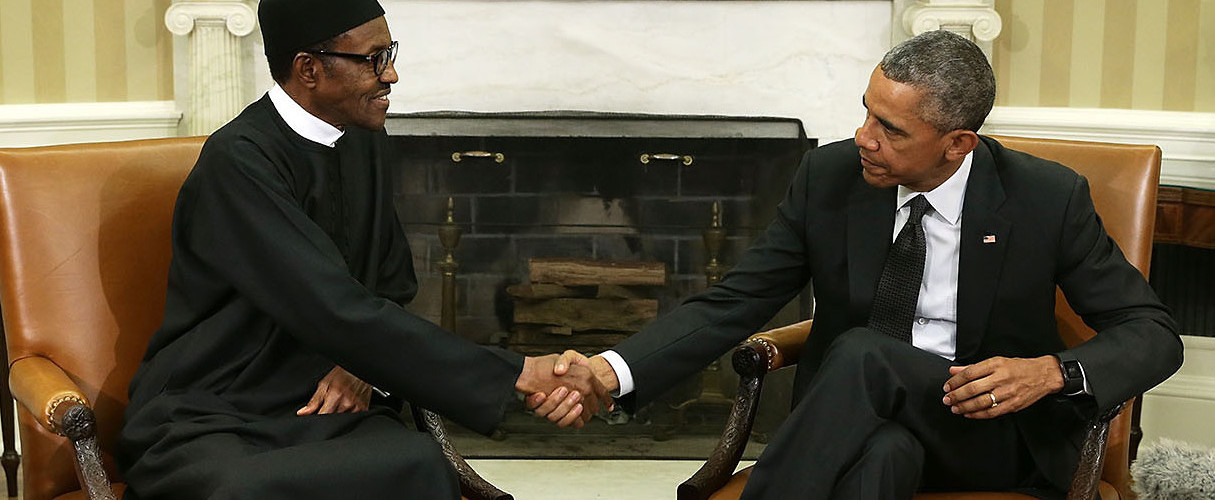Nigerian President Muhammadu Buhari (left) meets with US President Barack Obama. Washington, DC, July 20, 2015, (Alex Wong/AFP/Getty Images)
Speaking at Nigeria’s National Defence College in Abuja earlier this month, President Muhammadu Buhari outlined plans for the country to obtain “near self-sufficiency in military equipment and logistics production” and develop a “modest military-industrial complex.” This echoes previous government suggestions that Nigeria should expand the powers of its justice system to respond to its growing security concerns, which, I have argued, would likely be ineffective at best. Could the new plans be similarly flawed?
Buhari’s recent remarks come just a few weeks after his visit to the United States, where he took an unexpectedly frank stance towards the Leahy Law, which prohibits US military aid to countries who have violated human rights principles. Buhari said that application of the law had “aided and abetted” Boko Haram in its violent extremist activities. The previous administration of Goodluck Jonathan had also criticized American reluctance to provide arms to the fight against Boko Haram. Citing successful deals Nigeria had brokered with countries such as China, Russia, and Israel, an anonymous source from the administration was quoted as saying in February that the US, in contrast, was “playing games.”
Buhari’s comments ignited a US debate on the legislation; after meeting with representatives of the Nigerian military, Congressman Darell Issah suggested arms sales and military cooperation with the country would be restored. A group of congressmen visiting Nigeria also said Washington could lift the ban if Abuja improved its human rights record.
However, Buhari’s recent statements suggest that he is not counting on such support, and is determined to boost Nigeria’s homegrown defense capabilities as a result. As with previous calls to increase police numbers, however, suggesting that the country’s fight against Boko Haram has been hampered by inadequate arms overlooks deeper structural issues within the government and security sectors, which have enabled development of the most lethal insurgency since the country’s transition to democracy.
Buhari’s proposal for development of a Nigerian “military-industrial complex”—a term he seemingly uses uncritically—centers on providing a shot in the arm to the anemic Defense Industries Corporation of Nigeria (DICON). The president’s spokesman, Garba Shehu, said Buhari had requested the country’s defense chiefs “re-engineer” the institution.
Established in 1964 and based in the northern city of Kaduna, DICON has been in decline since the end of the country’s Civil War in 1970. While continuing to provide rifles, pistols, and machine guns for the Nigerian military, it has also expanded into the production of civilian goods and ceremonial swords to remain commercially viable. In a possible sign that revitalization efforts have already commenced, DICON welcomed a new director general just a few days before Buhari’s announcement.
While the institution is clearly in need of an overhaul, this will not necessarily solve Buhari’s problems with Boko Haram. To begin with, the admitted shortfall in local production of arms has largely been made up for by imports in recent years. Between 2005 and 2013, Nigerian arms imports rose from 27 million USD (in 2014 dollars) to over 63 million USD. According to Malcolm Chalmers, director of UK defense policy at the Royal United Services Institute for Defense and Security Studies, the overall upward trend in arms sales to Africa has largely been driven by ”concerns over domestic insurgencies.”





